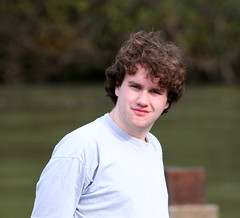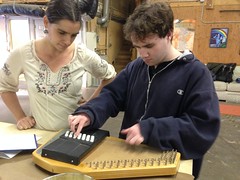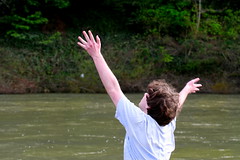Ian goes to college part 2 – His first day
Posted By Sara Gardner on August 26, 2014
 Ian is bravely trying out a college class at College of Marin. While it is not a community college in San Francisco complete with dorms, (one of Ian’s current dreams), it is a huge step towards the independent adult life that he is trying to build for himself and that his parents are working to support with all of their hearts. In true Dan and Janet fashion, when they looked at the current programs to support students with disabilities at the local community college and found them lacking, they set out to build something better.
Ian is bravely trying out a college class at College of Marin. While it is not a community college in San Francisco complete with dorms, (one of Ian’s current dreams), it is a huge step towards the independent adult life that he is trying to build for himself and that his parents are working to support with all of their hearts. In true Dan and Janet fashion, when they looked at the current programs to support students with disabilities at the local community college and found them lacking, they set out to build something better.
 Thus I am attending the class with Ian, not only to support him as a student, but to investigate the nature of supporting ASD (Autism Spectrum Disorder) individuals at the college level. In addition to thinking about balancing Ian’s needs with those of his teacher and classmates, I am going to be doing my best to think about how this support could be scaled up to meet the needs of other ASD students.
Thus I am attending the class with Ian, not only to support him as a student, but to investigate the nature of supporting ASD (Autism Spectrum Disorder) individuals at the college level. In addition to thinking about balancing Ian’s needs with those of his teacher and classmates, I am going to be doing my best to think about how this support could be scaled up to meet the needs of other ASD students.
 One of the joys and challenges of working with ASD individuals is the incredible diversity of their skills, talents and needs. During our first day of class, I noticed that Ian’s tendency is to tune out the intense verbal language of the lecture component of the class. While doing this, he is still working hard to stay regulated and to present an outward impression of paying attention. He is quiet and still at his desk and looks toward the teacher as she talks. Asking him questions, prompting him to write down essential concepts and reminding him to pay attention were strategies I tried to increase his level of attendance to the material being presented. I am helped in these efforts by the nature of the class, a drama class which teaches fundamental acting skills. As such, the class is taught by a woman who has a background in acting and who conducts her class in an engaging manor. High levels of affect naturally interest Ian, and prompt him to attend to the material. Another helpful element of the class is that the students tend to only spend small chunks of time on lecture material before being called to their feet and asked to put principles into active practice.
One of the joys and challenges of working with ASD individuals is the incredible diversity of their skills, talents and needs. During our first day of class, I noticed that Ian’s tendency is to tune out the intense verbal language of the lecture component of the class. While doing this, he is still working hard to stay regulated and to present an outward impression of paying attention. He is quiet and still at his desk and looks toward the teacher as she talks. Asking him questions, prompting him to write down essential concepts and reminding him to pay attention were strategies I tried to increase his level of attendance to the material being presented. I am helped in these efforts by the nature of the class, a drama class which teaches fundamental acting skills. As such, the class is taught by a woman who has a background in acting and who conducts her class in an engaging manor. High levels of affect naturally interest Ian, and prompt him to attend to the material. Another helpful element of the class is that the students tend to only spend small chunks of time on lecture material before being called to their feet and asked to put principles into active practice.
 During the circle exercises of the first day, passing names and gestures around a circle, first methodically and then in a random pattern, Ian displayed a very high level of engagement. He not only “got” the games, he was good at them. Over the course of these exercises, I saw the students’ perception of Ian change. Their attitude shifted from one of curiosity to one of interest, and he was chosen often by his peers to participate. He was good at remembering the names of his peers and who had or had not been already chosen. It was gratifying to see Ian engaging and succeeding. Our only interaction during this period was when he would catch my eye from across the room and I would give him a smile or thumbs-up. This first day showed me three different levels of engagement and motivation that Ian currently possesses. There was a language-based lecture that he needed a high level of support to gain benefit from, a short film sequence and some short monologue performances that Ian watched intently and was able to comment on with very little scaffolding/prompting, and there were the active exercises, which he was able to attend to and participate in without support.
During the circle exercises of the first day, passing names and gestures around a circle, first methodically and then in a random pattern, Ian displayed a very high level of engagement. He not only “got” the games, he was good at them. Over the course of these exercises, I saw the students’ perception of Ian change. Their attitude shifted from one of curiosity to one of interest, and he was chosen often by his peers to participate. He was good at remembering the names of his peers and who had or had not been already chosen. It was gratifying to see Ian engaging and succeeding. Our only interaction during this period was when he would catch my eye from across the room and I would give him a smile or thumbs-up. This first day showed me three different levels of engagement and motivation that Ian currently possesses. There was a language-based lecture that he needed a high level of support to gain benefit from, a short film sequence and some short monologue performances that Ian watched intently and was able to comment on with very little scaffolding/prompting, and there were the active exercises, which he was able to attend to and participate in without support.
 The drama exercises can be viewed as intense focused social interactions that follow distinct sets of rules. With these rules in place, Ian was able to have prolonged interactions with his peers, both one-on-one and as a group. This component of the class is important, challenging, and highly motivating for Ian. He is a member of an ensemble. He is having to stretch himself to fulfill his obligation to the ensemble, and some of his peers may be having to stretch their perception of disability in order to fulfill their obligations to him. I find this to be incredibly healthy stretching for all parties.
The drama exercises can be viewed as intense focused social interactions that follow distinct sets of rules. With these rules in place, Ian was able to have prolonged interactions with his peers, both one-on-one and as a group. This component of the class is important, challenging, and highly motivating for Ian. He is a member of an ensemble. He is having to stretch himself to fulfill his obligation to the ensemble, and some of his peers may be having to stretch their perception of disability in order to fulfill their obligations to him. I find this to be incredibly healthy stretching for all parties.




Comments